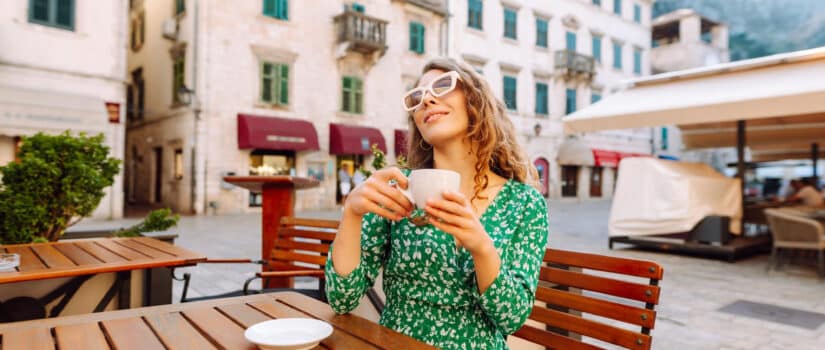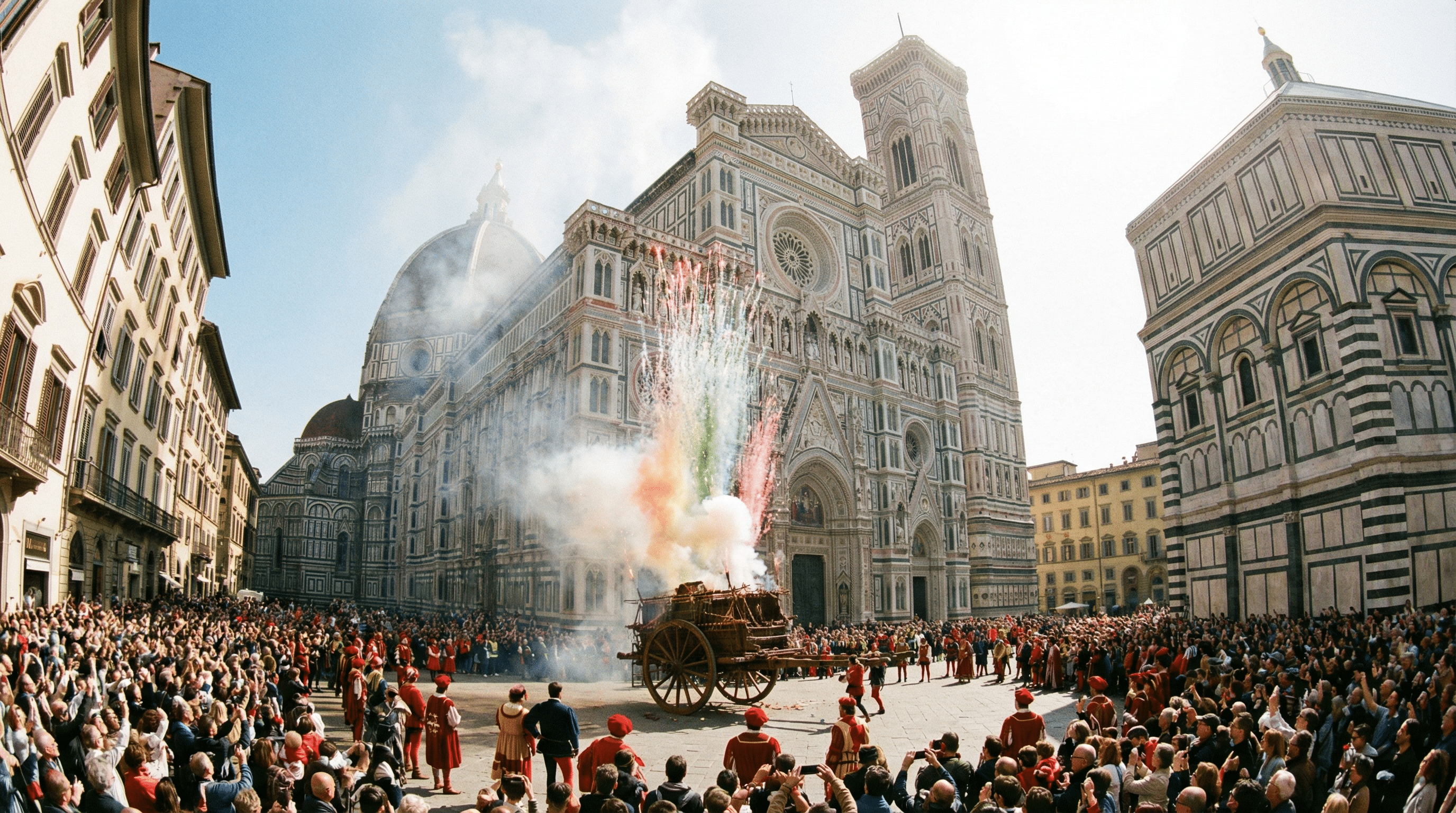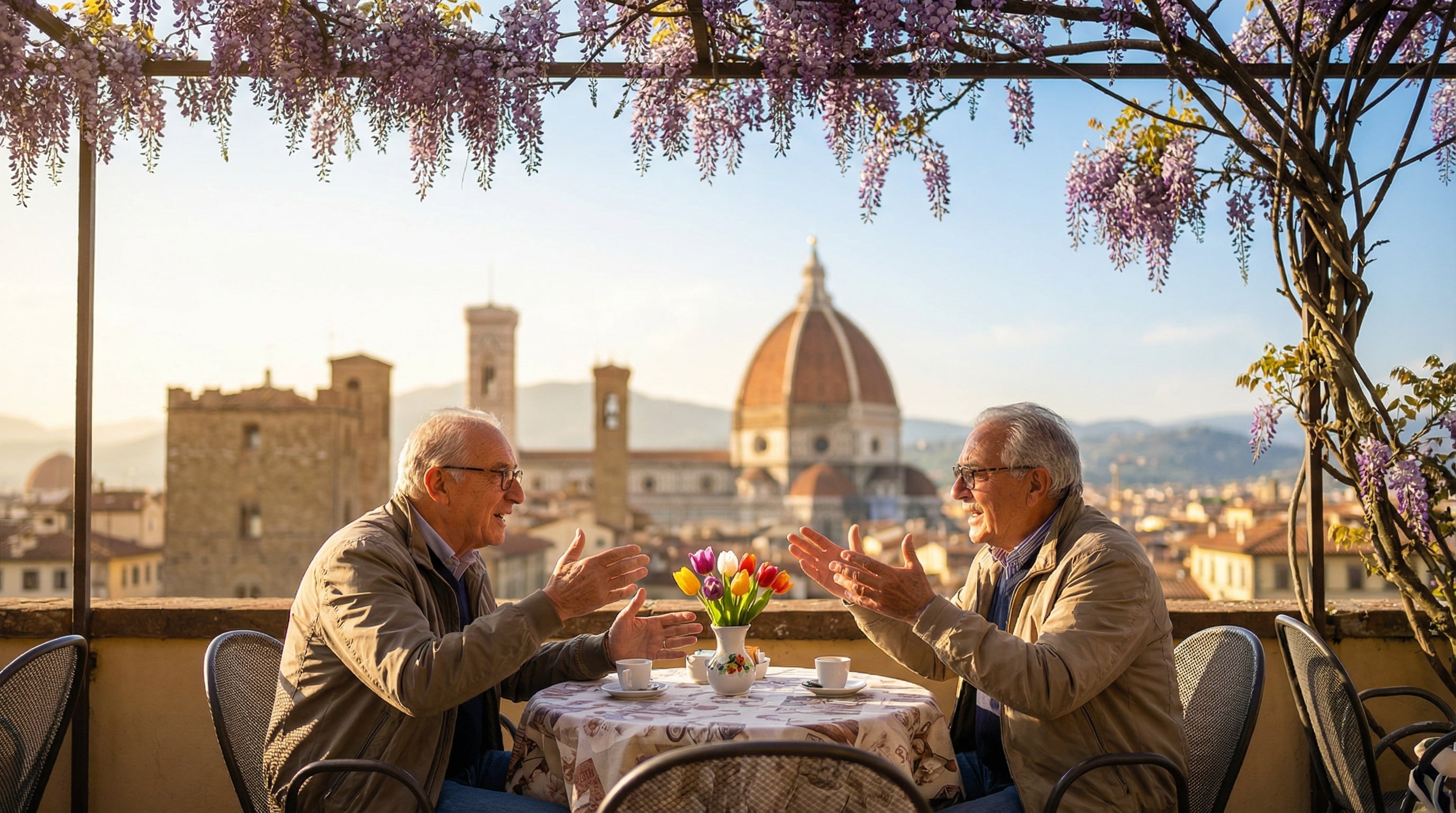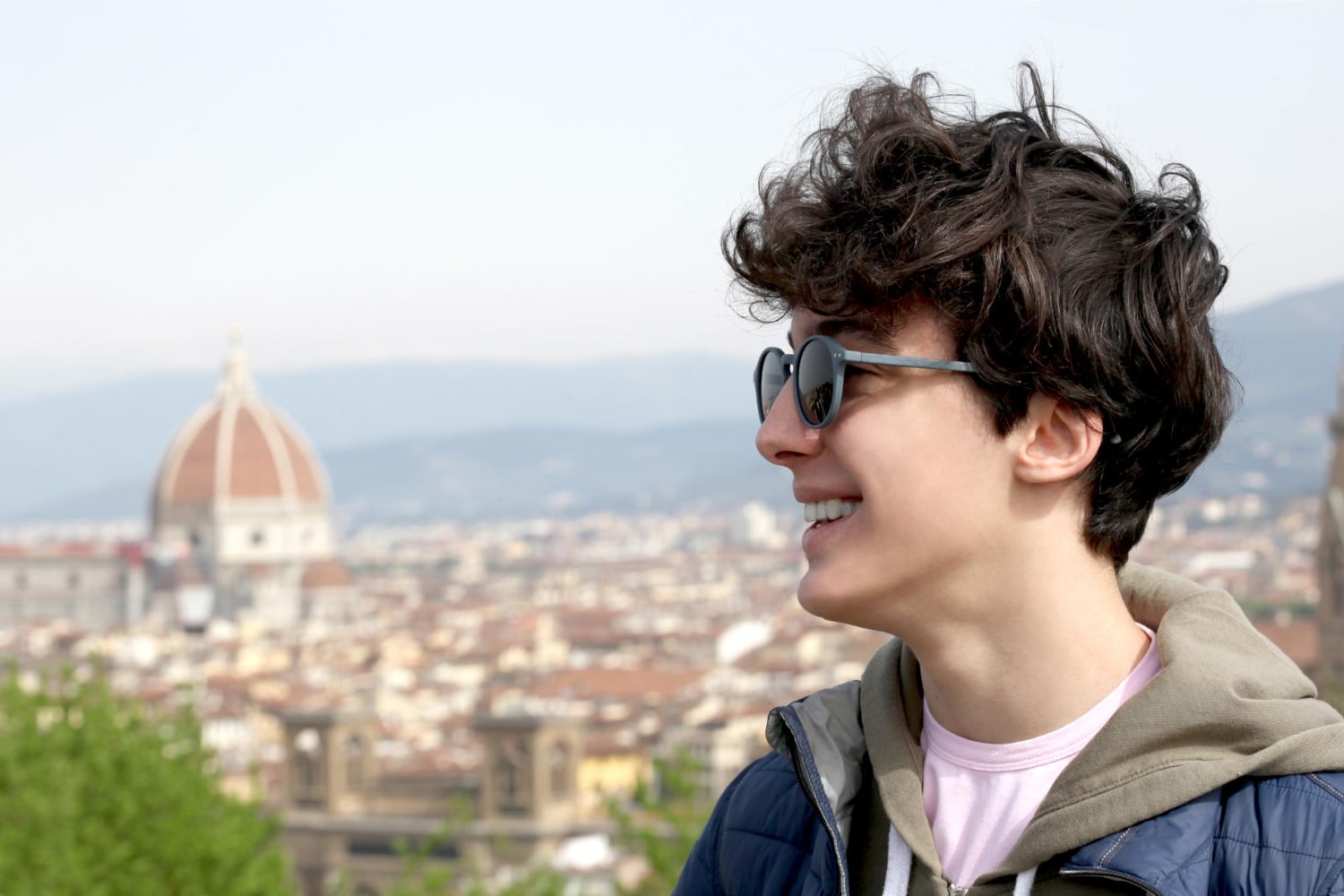Coffee Rituals in Florence – Reconnecting Every September
The sun spills over terracotta rooftops as Florence awakens from its August slumber. It’s early September, and a fiorentino (Florentine) steps into his neighborhood bar (café) where the familiar scent of espresso fills the air. At 8 AM, the barista greets him with a warm “Bentornato!” (welcome back) and the question, “Il solito?” (“The usual?”) – signaling a return to comforting routine. Locals line the counter, exchanging stories of summer holidays between sips of robust caffè (espresso). After weeks of steamy summer quiet, the city is coming alive again. Shops are reopening, and i bar riprendono a servire il caffè agli habitué – “bars resume serving coffee to their regulars”. In Florence, September is more than just the end of summer; it’s a moment of reconnection and renewal, with coffee at its cultural heart.
September in Florence: Returning to Routine
In Italy, September often feels like a fresh start – “quasi un Capodanno anticipato”, almost an early New Year, as one Italian coffee blog describes it. The blistering heat of August fades, tourists thin out, and Florentines reclaim their city. There’s a collective sense of rientro (return): parents go back to work, children prepare for a new school year, and daily life picks up its usual pace. In Florence, this transition is palpable. The morning air turns crisp and profuma di nuovi inizi – “smells of new beginnings”, inviting everyone to dive into familiar habits once again. And at the core of these habits is the simple act of taking coffee. The prima colazione (breakfast) often means a quick cappuccino or espresso enjoyed at the counter, reconnecting people with a sense of normalcy.
Coffee after Ferragosto: August (especially around Ferragosto, the August 15 holiday) is vacation time in Italy – many businesses close and locals escape the city’s heat. When September arrives, Florentines ease back into their routines, often ripartendo con energia – “restarting with energy” – thanks to that first coffee of the day. An Italian saying goes, “Il primo caffè di settembre sa di nuovo inizio,” meaning “the first coffee of September tastes like a new beginning.” Indeed, as shops lift their shutters and familiar faces reappear in the piazzas, a shared coffee helps everyone feel that life is returning to its comforting groove. The morning espresso ritual becomes a gentle nudge that the holiday is over and it’s time to get moving again – with gusto.
Morning Espresso Rituals: Grounding the Day
One of the most cherished daily rituals in Florence is the morning espresso at the bar. Unlike the grab-and-go coffee culture elsewhere, Italian mornings often begin standing at a bar counter, elbow-to-elbow with neighbors and colleagues. There is a tangible rhythm to it: a quick “Buongiorno” to the barista, a clink of porcelain cups, a few sprinkled words about the news or last night’s football match, and within a minute the rich, dark caffè is downed. This swift ritual somehow centers the day. After the carefree chaos of summer, these small routines provide structure.
Importantly, the café (bar) is a social hub in Italian culture. It’s common to see the same patrons every morning – they are known as habitué, the regulars. Over time, everyone gets to know each other. “Bars are social gathering places where people see neighbors, friends and coworkers,” and a good barista often “knows you, knows your kids and knows where you went on vacation”. In September, those vacation stories get traded right there at the counter. A simple coffee order can turn into a reunion: “Prendiamoci un caffè e raccontami delle tue vacanze” – “Let’s have a coffee and you can tell me about your holidays.” These morning espresso rituals act as an anchor, grounding Florentines back into community life after the summer break.
It’s also during these morning pauses that one might hear exchanges of settembre small talk. A typical bar conversation in early September: “Com’è andata al mare?” (“How was the seaside?”) – “Bellissimo, ma ora ci vuole un bel caffè per ricominciare.” (“Wonderful, but now one needs a nice coffee to start again.”) With a laugh, they acknowledge that, indeed, nothing jump-starts the return to work like an espresso. As Italians often say, “un caffè ci vuole” – loosely, “you really need a coffee” – to face the day, especially after a relaxed summer.
The Coffee Break (Pausa Caffè) as Social Glue
As the workday unfolds, the mid-morning or afternoon pausa caffè (coffee break) is almost sacred in Florence. It’s not just about getting a caffeine fix; it’s a moment to pause and reconnect with others. Colleagues might step out of the office together, declaring “Prendiamoci un caffè!” (“Let’s grab a coffee!”) as a cheerful excuse to take a breather. At the corner bar, they stand together sipping caffè macchiato or cappuccino (if it’s still before lunch) and catching up on life. This ritual is so ingrained that even studies note how a coffee break “favorisce gli scambi di idee e le relazioni” – encourages the exchange of ideas and relationships – among peersbruneau.it. In other words, a coffee break isn’t wasting time; it’s building community and even boosting productivity. Stepping away from the desk for a few minutes of conversation over coffee can relieve the stress of rientro (returning to work) and spark fresh ideas.
In Florentine culture, the coffee break is a social leveller. Professors, shopkeepers, executives, and students alike might crowd the same bar counter. Over tiny cups of espresso, titles and job roles fade; what remains is the shared pleasure of the moment. The most important aspect, as one Italian coffee company blog highlights, is that it “encourages socializing among colleagues” and creates a real sense of camaraderie during the workday. After the solitude of summer vacations (or the frenzy of tourist season for those in the hospitality business), these pauses in September allow everyone to reconnect as people. A joke about the tough first week back in the office, a bit of gossip about a mutual friend, or simply a collective sigh of “Che caldo oggi!” (“It’s hot today!”) – all of it reinforces a sense of belonging. In the piazzas of Florence, you’ll also find friends meeting in the late afternoon for a coffee, using the opportunity to sit down at an outdoor table and chat as the city buzzes back to life around them. In this way, coffee acts as social glue, binding Florentines together in the fabric of everyday life.
Language Learning Through Coffee Culture
For those learning Italian or hoping to dive deeper into local culture, coffee rituals offer a perfect gateway. The bar is an ideal classroom: every interaction is a chance to practice the language in a natural setting. Ordering a coffee is usually simple – “Un caffè, per favore” – but it opens the door to countless cultural nuances. For example, you’ll quickly learn that un caffè always means an espresso, that a caffè latte is mostly milk (since latte means milk), and that saying “grazie” to the barista might prompt a friendly “prego” and a smile. These small exchanges build confidence for a language learner.
More than that, being present in an Italian bar teaches the unspoken rules and rhythms of communication. You observe how Florentines rarely actually say “espresso” – they just say caffè, or how locals casually throw out a “Ciao, come stai?” (“Hi, how are you?”) to a neighbor while stirring sugar into their cup. You can mimic these phrases and gestures, gradually feeling less like an outsider. Immersion isn’t just about formal study – as one language expert notes, “immersion isn’t one thing… It’s learning about the culture… Immersion can be [as simple as] having coffee on a square”. In Florence, that might mean standing at a marble counter in a tiny bar or lounging at a café in Piazza Santo Spirito. By engaging in the coffee ritual, language learners practice Italian in context and connect with the heartbeat of Florentine life.
Engage with “Prendiamoci un caffè”: This common phrase literally means “let’s take a coffee,” and it’s an invitation not just to drink coffee but to spend time together. If you’re a language learner, try using it with your Italian friends or classmates – “Prendiamoci un caffè dopo lezione?” (“Shall we grab a coffee after class?”). It’s a friendly, culturally authentic way to suggest a meetup. Over that coffee, you might pick up new vocabulary or local slang amid the chatter. Don’t be shy to use Italian in these moments; Florentines are generally delighted when foreigners embrace their language, even if just to say “Buongiorno, un cappuccino per favore” in the morning. By participating in the ritual, you’ll not only get your caffeine boost but also a real taste of Italian life and language.
Italian Coffee Vocabulary for a September Reset
To fully appreciate Florence’s coffee culture in the post-summer season, it helps to know a few Italian words and expressions. Here are some useful terms and sayings related to coffee and the September restart:
- “Prendiamoci un caffè” – “Let’s have a coffee.” A versatile invitation to take a break together, often used to catch up with someone (literally, “let’s take ourselves a coffee”). In September, you’ll hear this as friends and coworkers rejoin each other after the holidays.
- “Ripartire con energia” – “To restart with energy.” A phrase that captures the spirit of September. After the slow summer weeks, Italians talk about ripartire (starting up again) with vigor – and often attribute that energy to a good coffee! For example: “Dopo le ferie, bisogna ripartire con energia… magari grazie a un buon caffè.” (“After the holidays, one must restart with energy… maybe thanks to a good coffee.”)
- “Pausa caffè” – “Coffee break.” An institution in Italian workplaces. Taking a pausa caffè is considered essential, not optional, for maintaining morale. It’s when colleagues reconnect and swap news. In Florence, your boss or teacher might even encourage a pausa caffè to keep everyone sharp and social.
- “Il bar” – In Italy, “il bar” is not just a place for alcohol – it’s primarily a coffee shop. It’s where you get your morning espresso or afternoon macchiato. Florentines often refer to their neighborhood café simply as il bar sotto casa (“the bar below the house”) or il mio bar (“my bar”), highlighting how personal and routine this space is.
- “Buon rientro” – “Happy return (to work/school).” In early September you might hear this greeting. It’s a kind wish people exchange as everyone gets back to their posts. For example, colleagues seeing each other after vacation will say, “Buon rientro!” while clinking coffee cups, acknowledging that the grind is starting again but with a positive spirit.
Learning these words and sayings not only expands your Italian vocabulary but also lets you participate more naturally in the local custom. The next time you find yourself in Florence in September, try ordering your coffee in Italian and wish someone “buon rientro.” You’ll likely earn a smile, and perhaps even dive into a spontaneous conversation about how your summer went.
Conclusion: Coffee as a Cultural Re-Centering
In Florence, coffee is far more than a beverage – it’s a ritual that marks the rhythm of the day and the turning of seasons. Especially in September, after the lull of summer, the act of sharing a coffee helps everyone ritrovare la normalità (find normalcy again). From the first morning espresso that nudges the city awake to the collegial cheer of a midday pausa caffè, these moments provide structure and comfort. They remind Florentines that, even as life speeds up again, there is always time to savor a small joy together.
For an outsider or a language learner, joining in these coffee rituals is one of the richest ways to experience Italian culture. You’ll see first-hand why Italians say coffee is a social catalyst – how a few minutes at the bar can foster connection, whether you’re discussing summer adventures, commiserating about the return to work, or simply exchanging a knowing grin over the cup. As you stand there sipping your espresso, you become part of the Florence community for that moment.
So, if you find yourself in Florence this September (or any time of year, really), do as the locals do: pause at the counter, inhale the aroma of freshly brewed coffee, and chat with those around you. In the clink of cups and the murmur of Italian conversation, you’ll feel the city’s pulse – and you might just order un altro caffè (another coffee) while you’re at it. E perché no? (And why not?) After all, in Florence, coffee is not merely drunk – it’s lived.
References
- Italy Translated – Coffee Break – Italian Style. Insight into Italian bar culture and how coffee bars serve as social hubs where everyone knows each otheritalytranslated.com.
- Firenze Ora – Firenze a settembre: il ritorno della vita tra bellezza e nostalgia. Describes how Florence in early September comes back to life: “shops reopen, bars resume serving coffee to regulars…”firenzeora.it. (Italian)
- Caffè Vergnano Blog – Settembre, si riparte: carta, penna e caffè…. Portrays September as an “almost New Year” with a fresh start atmospherecaffevergnano.com. (Italian)
- Bruneau Magazine – La pausa caffè aumenta la produttività. Highlights the benefits of coffee breaks for social interaction and productivity, noting that a coffee break “favorisce gli scambi di idee e le relazioni”bruneau.it. (Italian)
- Kaufmann, Steve – The Truth About Language Immersion (The Linguist Blog). Emphasizes cultural immersion in language learning, e.g. “Immersion can be […] having coffee on a square”blog.thelinguist.com, underlining the value of everyday activities like coffee for engaging with language and culture.



